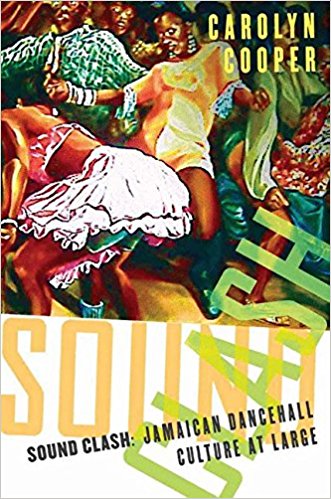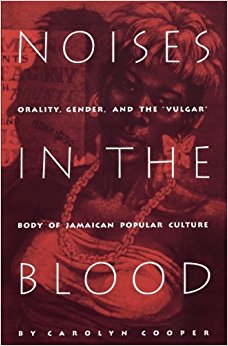Background
Mr. Cooper was born in Kingston, Jamaica, on November 20, 1950. She is a daughter of Daniel George (a tailor) and Modesta Veronica (a teacher) Cooper. Her parents were members of the Seventh-day Adventist Church.


(Megawattage sound systems have blasted the electronically...)
Megawattage sound systems have blasted the electronically-enhanced riddims and tongue-twisting lyrics of Jamaica's dancehall DJs across the globe. This high-energy raggamuffin music is often dismissed by old-school roots reggae fans as a raucous degeneration of classic Jamaican popular music. In this provocative study of dancehall culture, Cooper offers a sympathetic account of the philosophy of a wide range of dancehall DJs: Shabba Ranks, Lady Saw, Ninjaman, Capleton, Buju Banton, Anthony B and Apache Indian. Cooper also demonstrates the ways in which the language of dancehall culture, often devalued as mere 'noise,' articulates a complex understanding of the border clashes which characterize Jamaican society, and analyzes the sound clashes that erupt in the movement of Jamaican dancehall culture across national borders.
http://www.amazon.com/gp/product/1403964246/?tag=2022091-20

(The language of Jamaican popular culture—its folklore, id...)
The language of Jamaican popular culture—its folklore, idioms, music, poetry, song—even when written is based on a tradition of sound, an orality that has often been denigrated as not worthy of serious study. In Noises in the Blood, Carolyn Cooper critically examines the dismissed discourse of Jamaica’s vibrant popular culture and reclaims these cultural forms, both oral and textual, from an undeserved neglect. Cooper’s exploration of Jamaican popular culture covers a wide range of topics, including Bob Marley’s lyrics, the performance poetry of Louise Bennett, Mikey Smith, and Jean Binta Breeze, Michael Thelwell’s novelization of The Harder They Come, the Sistren Theater Collective’s Lionheart Gal, and the vitality of the Jamaican DJ culture. Her analysis of this cultural "noise" conveys the powerful and evocative content of these writers and performers and emphasizes their contribution to an undervalued Caribbean identity. Making the connection between this orality, the feminized Jamaican "mother tongue," and the characterization of this culture as low or coarse or vulgar, she incorporates issues of gender into her postcolonial perspective. Cooper powerfully argues that these contemporary vernacular forms must be recognized as genuine expressions of Jamaican culture and as expressions of resistance to marginalization, racism, and sexism. With its focus on the continuum of oral/textual performance in Jamaican culture, Noises in the Blood, vividly and stylishly written, offers a distinctive approach to Caribbean cultural studies. The language of Jamaican popular culture—its folklore, idioms, music, poetry, song—even when written is based on a tradition of sound, an orality that has often been denigrated as not worthy of serious study. In Noises in the Blood, Carolyn Cooper critically examines the dismissed discourse of Jamaica’s vibrant popular culture and reclaims these cultural forms, both oral and textual, from an undeserved neglect. Cooper’s exploration of Jamaican popular culture covers a wide range of topics, including Bob Marley’s lyrics, the performance poetry of Louise Bennett, Mikey Smith, and Jean Binta Breeze, Michael Thelwell’s novelization of The Harder They Come, the Sistren Theater Collective’s Lionheart Gal, and the vitality of the Jamaican DJ culture. Her analysis of this cultural "noise" conveys the powerful and evocative content of these writers and performers and emphasizes their contribution to an undervalued Caribbean identity. Making the connection between this orality, the feminized Jamaican "mother tongue," and the characterization of this culture as low or coarse or vulgar, she incorporates issues of gender into her postcolonial perspective. Cooper powerfully argues that these contemporary vernacular forms must be recognized as genuine expressions of Jamaican culture and as expressions of resistance to marginalization, racism, and sexism. With its focus on the continuum of oral/textual performance in Jamaican culture, Noises in the Blood, vividly and stylishly written, offers a distinctive approach to Caribbean cultural studies.
http://www.amazon.com/gp/product/0822315955/?tag=2022091-20
Mr. Cooper was born in Kingston, Jamaica, on November 20, 1950. She is a daughter of Daniel George (a tailor) and Modesta Veronica (a teacher) Cooper. Her parents were members of the Seventh-day Adventist Church.
Carolyn Cooper graduated from University of the West Indies, receiving Bachelor of Arts degree in 1971. She also obtained Master of Arts in 1972 and Doctor of Philosophy in 1977 from University of Toronto.
In 1970 Mrs. Cooper was appointed interim English teacher at a high school in Kingston, Jamaica. From 1975 to 1980 she served as a assistant professor at Atlantic Union College, South Lancaster, MA. In 1980 Mrs. Cooper was an associate professor of English, between 1977 and 1978 he worked as a director of All College Cultural Study of the Caribbean and coordinator of study-abroad research visit to Jamaica.
From 1978 till 1980 Carolyn Cooper was a member of executive committee of Adult Degree Program, from 1980 she was a director of program. During the period of 1979-1980 Mrs. Cooper held the post of the head of Honors Core Curriculum Program. During 1980-1990 she worked at University of the West Indies, Kingston, as a lecturer. Since 1990 Carolyn Cooper took up the position of a senior lecturer in English. In 1982 she was appointed visiting lecturer at University of Hull.
Since 1986 Mrs. Cooper held the position of a guest lecturer at University of California, Los Angeles. In 1990 she was appointed guest lecturer at University of Pennsylvania, in 1993 visiting professor at Spelman College, in 1994 visiting scholar Bridgewater College.
From 1988 Carolyn Cooper worked as a course facilitator at Jamaica Telephone Co. Ltd.
Between 1983 and 1984 she held the post of an assistant chief examiner in English Caribbean Examinations Council. In 1995 she became a director of Pulse Investments Ltd. And later a judge of literary competitions.
Mrs. Cooper is also the author of the books, contributor of articles and reviews to periodicals, including Massachusetts Review, Caribbean Quarterly, Journal of West Indian Literature, Lifestyle, Jamaica Journal, and World Literature Written in English. Some writings appear under the pseudonym Georgia Riley.
She was instrumental in establishing in 1994 the Reggae Studies Unit at the University of the West Indies, Mona, which has hosted numerous public lectures and symposiums featuring reggae/dancehall artists and other practitioners in the music industry in Jamaica and internationally such as Lady Saw, Vybz Kartel, Bounty Killer, Tony Rebel, Ninjaman, Louise Frazer-Bennett, Christine Hewett, Tanya Stephens, Gentleman and Queen Ifrica. Professor Cooper founded the annual Bob Marley Lecture in 1997.
A well-known media personality in Jamaica, Mrs. Cooper is a weekly columnist for the Sunday Gleaner. In the 1990s, she co-hosted a television show, Man and Woman Story, with Dr Leahcim Semaj for the Jamaica Broadcasting Corporation. She also co-hosted a public affairs program, Question Time on CVM television; and, more recently, Big People Sup'm on PBC Jamaica.
The Jamaica Gleaner listed Carolyn Cooper as sixth in their list of "The 10 Best-Dressed Men & Women Of 2011".
(The language of Jamaican popular culture—its folklore, id...)
(Megawattage sound systems have blasted the electronically...)
Carolyn Cooper married Cecil Robert Gutzmore (a professor) on September 1, 1996.
